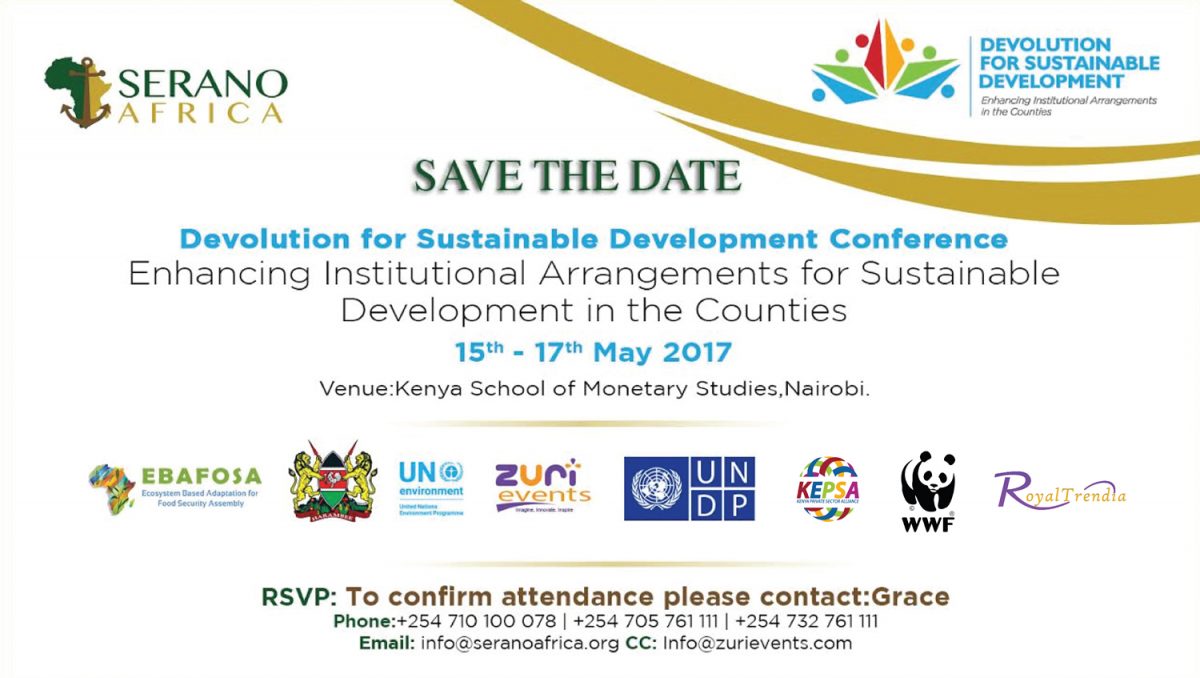Serano Africa, in collaboration with the Ministry of Devolution and Planning (MoDP), United Nations Development Programme (UNDP), United Nations Environment Programme (UNEP), Ecosystem Based Adaptation for Food Security Assembly (EBAFOSA), Kenya Diaspora Alliance (KDA), University of Nairobi, the United States International University – Africa and Council of Governors (CoG), has organized the First Annual Devolution for Sustainable Development Conference on 15th to 17 May 2017 at The Kenya School of Monetary Studies (KSMS).
The theme of the conference is, “Enhancing Institutional Arrangements for Sustainable Development in the Counties”.
The key goal is to establish frameworks for creating and delivering scalable value for sustainable development within the devolved system in Kenya.
The conference will bring together participants from private sector, national government, county governments, academia, civil society, public policy practitioners, researchers and development partners.
The promotion of socio-economic development at the grassroots level where it most benefits the populace is one of the key objects, strengths and aims of devolution as outlined in the Constitution of Kenya 2010.
We are faced with major development challenges such as making democracy work for ordinary people, economic growth without development, increased economic and social inequality, vulnerable rural communities, fragile urbanization, climate change, gender disparities, massive youth and women unemployment and ecological disharmony.
The Millennium Development Goals (MDGs) were a bold attempt to provide a globally agreed framework for solving universal challenges.
Drawing from the gains achieved from the MDGs, 193 Heads of State and Governments in September 2015 agreed to the expanded Sustainable Development Goals (SDG) Framework to complete the unfinished work from the MDGs and include other new broad areas of development.
In Kenya, the full realization of the SDGs benefits will occur in the context of the counties. We therefore have a responsibility to work in a coordinated concert with different actors and stakeholders to realize sustainable devolution and development.
Counties are the basic local governance units where we can promote localization, mainstreaming and implementation of viable, inclusive and gender responsive sustainable development programs.
Searching for sustainable solutions to county development challenges and the means for the implementation of SDGs requires enhancing and aligning institutional arrangements at the counties.
The main issues that fall within this scope include the development of a comprehensive legal framework to facilitate implementation of SDGS at the county, a business friendly and pro investment subnational environment, identification and preparation of sustainable turnaround projects in climate-smart agriculture, energy, public service provision, water and sanitation, affordable housing, entrepreneurship development for youth and women, growing local innovations for trade, generation of reliable data for planning and supportive ICT tools, skilled human capital development and realization of inclusive and equitable development within and among counties.
To effectively and sustainably localize and mainstream the implementation of SDGs in Kenya, we believe that it is important to enhance institutional arrangements in the counties.
This will go a long way into creating frameworks, supporting organized and well-coordinated programs targeted at empowering the youth and women as active agents of sustainable development, help create an ecosystem supportive of doing sustainable business for development and working
with a community of partners who are technically inclined towards the delivery of the SDGs and Vision 2030.
The Conference Framework
At the core of devolution and SDGs is the overarching goal of promoting inclusive, equitable, fair and high quality life – development for all.
Important pillars upon which to build and successfully enhance institutional arrangements in the counties for strengthening devolution and realize sustainable development include:
• Policy harmonization and legal sustainability framework that is receptive to investments;
• Partnerships and collaborations for effective implementation of SDGs;
• Turnaround projects that are viable, inclusive, sustainable and bankable; and
• Sustainable local governance, leadership and institutional models that work.
In the fullness of time, this framework essentially outlines the foundational posts that shape both the scope and pace of pursuing programs for implanting sustainable devolution and development.
Technical work needs to incrementally address the policy and legislative gaps between national and county governments to create a harmonized and well-coordinated working framework to overcome fault-lines in the devolution process that include:
• Lack of pro-business/investment policy and legal framework at the grassroots level;
• Generation of reliable data and supportive ICT tools necessary for effective planning;
• Identification and preparation of viable, sustainable and bankable turnaround projects;
• Human capital development and possible marginalization within the counties.
Conference Objectives
The objectives of the conference are as follows:
• Engaging participants on the policy & institutional sustainability framework supportive of wealth creation and sustainable development at the counties.
• Broadening the understanding of the kind of business partnerships and collaborations required to adopt and achieve the implementation of SDGs.
• Appreciating the process of identifying turnaround projects that are inclusive, gender responsive, sustainable and bankable.
• Recognizing climate action as an economic development opportunity rather than a regulatory action.
• Reviewing the process of creating sustainable local governance and institutional models to make devolution work for youth and ordinary Kenyans.
Conference Outcomes
To achieve the above goal and objectives, the following are the expected outcomes:
• Identified necessary components of institutional arrangements to be strengthened for effective delivery of sustainable development in the counties.
• Recognize specific policy and legal elements that are supportive of sustainable investments within and across the counties.
• Determine strategies for engaging with stakeholders for mainstreaming and implementing SDGs at the county level.
• Determine a criteria for identifying, designing, and preparing inclusive, bankable and sustainable turnaround projects in the counties (Business adoption of SDGs).
• Mobilized resources for the Policy Studies Center for Devolution and Sustainable Development – to serve as the focal point for coordinating and carrying out advanced policy studies and research in devolution and sustainable development.
• Develop a ‘Youth Engagement for Sustainable Development Program’ for innovative competition in universities and counties – winning champions prize of $500.
• Conducted capacity building for SDGs in various county blocks in the country and among key SDGs delivery institutions. Findings of the conference will inform the 2nd generation of CIDP’s can incorporate SDGs.
• Process key conference presentations into a book.
Why Attend and Participate at the Conference?
The Devolution for Sustainable Development Conference will be an open event for everyone interested in making devolution and sustainable development successful in Kenya.
Therefore, participants will be drawn from corporate business, development partners and program implementing organizations, community service providers, the community of academia and researchers, national government and county governments.
The conference will be a uniquely relevant learning and networking experience for which investing in the trip to Nairobi is absolutely worthwhile.
It therefore follows that either as public, private, intergovernmental organization, scholastic or civil society, we have a stake in helping to create a well-coordinated active and critical space cum platform where it is possible to co-invest sustainably and dialogue on realisation of sustainable development.
Negotiating sustainability in devolution and development will in the end serve more Kenyans through offering services and products that are relevant to the global discourses as well demand driven by the counties.
SDGs offer new viable business and development opportunities for all of us.
Conference Sponsorship and Exhibition
To sponsor and exhibit at the Devolution for Sustainable Development Conference allows you to show case your products and services to over 300 key decision-makers.
Supporting us and exhibiting at the conference gives your organisation the opportunity to share/deliver exciting product and service demonstrations with other industry players and plug into the sustainable development space and the changing networks on sustainability.
Your brand will be pre-eminently featured in the Journal of Devolution and Sustainable Development.
There are speaking opportunities, high visibility and exposure on the emerging ideas on business opportunities in SDGs, enhanced brand recognition, formal and organic B2B programing, excellent networking opportunities, great access to leading business, development and governance leaders focused on shaping the next generation of sustainable development and devolution.
You will become part of the team working on making global goals into local business opportunities (for further details on sponsorships kindly email info@seranoafrica.com)
Keynote Speakers:
H.E. Mr. Siddharth Chatterjee – UNRC and UNDP Resident Representative
Amb. Dennis Awori – Toyota Kenya Chairman
Hon. Mwangi Kiunjuri – Cabinet Secretary, Ministry of Devolution and Planning
Dr. James Mwangi – Group CEO and MD at Equity Bank Holdings
Prof. Paul T. Zeleza – Vice Chancellor, USIU Africa
Dr. John Mutakha Kangu – Governance & Constitutional Law Expert
Dr. Agnes Kalibata – President, AGRA
Prof. Patricia Kameri Mbote – Professor of Law, University of Nairobi
Mr. Bob Collymore – CEO, Safaricom
Dr. Shem Ochuodho – Global Chairman of the Kenya Diaspora Alliance
Dr. Caesar Mwangi – Managing Director, Centre for Personal Leadership
Mr. Karim Anjarwalla – Managing Partner, Anjarwalla & Khanna (A&K)
Collaborating Partners and Sponsors of the Conference
The following organisations have collaborated in the organisation of the conference:
Ministry of Devolution and Planning (MoDP)
UN-SDGs Technical Working Group – (UNDP)
United Nations Environment Programme (UNEP)
Kenya Diaspora Alliance (KDA)
The University of Nairobi (UoN)
United States International University – Africa
Kenya Private Sector Alliance (KEPSA)
Safaricom Limited
Council of Governors (COG)
Ignite Trade Africa (ITA)
Equity Group Holdings
Targeted Counties – Taita Taveta, Nairobi, Makueni, Kiambu, Turkana, Elgeyo/Marakwet, Kajiado, Kisii, Kakamega, Meru and Homa Bay






